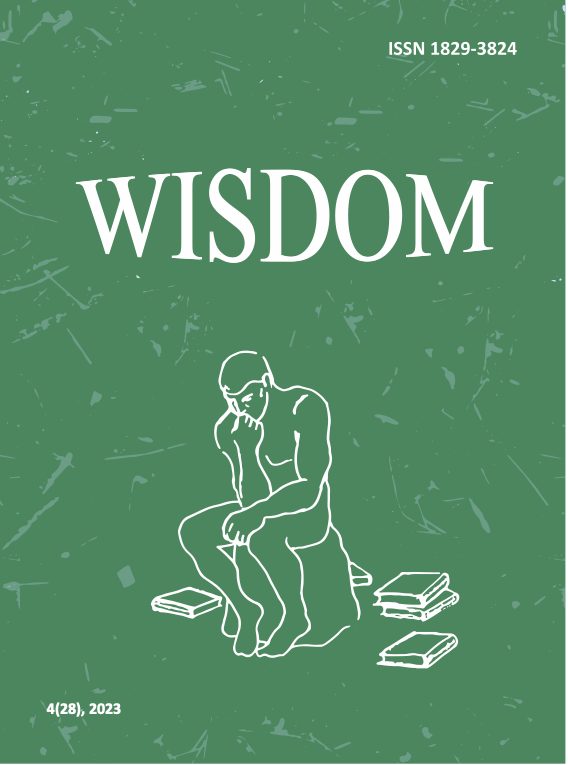The Idea of Human Rights: From the Ancient World to the Digital Age
DOI:
https://doi.org/10.24234/wisdom.v1i1.663Keywords:
human rights and freedoms, the idea of human rights, the principle of formal equality, digitalization, digital technologiesAbstract
The purpose of the article is to identify the features of the development of the idea of human rights, starting from the Ancient World, and on this basis to show its significance in the digital age. To achieve this goal, the conceptual foundations of the idea of human rights and their reflection in political and legal thought at different stages of the evolution of society and science are analysed. The subject of the study was the concept of human rights. The study was conducted on the basis of post-non-classical scientific methodology, including constructivism. The formal-legal and comparative-historical methods are also used.
According to the results of the study, it is concluded that in the conditions of modern technological development, digitalisation is becoming a challenge to the idea of human rights, a threat to individual freedom, and therefore it is necessary to develop and implement new legal mechanisms that would guarantee the full implementation of fundamental rights and freedoms, provide the necessary balance between individual freedom and public security. In this context, the legal consolidation and practical implementation of the principle of formal equality become important.
Downloads
References
Alekseev, S. S. (2015). Samoe svjatoye chto est u Boga na zemle. Immanuil Kant I problem prava v sovremennuju heru (The most sacred thing that God has on the Earth. Immanuel Kant and problems of law in the modern era: monograph, in Russian). (2nd ed.). Moscow: Norm, INFRA ñ M.
Beck, W. (2000). Obshchestvo riska. Na puti k drugomu modernu (Risk societies. On the way to another modern, in Russian). Moscow: Progress ñTradition.
Clapham, A. (1993). Human rights in the private sphere. Oxford: Oxford University Press.
Garkavchenko, O. Y., Maistrovich, E. V., Pashentsev, D. A., & Mirzalimov, R. M. (2019). Istoria politicheskikh i grazdanskikh prav zhenshchin v Evrope: Frantsiya (The history of political and civil rights of women in Europe: France, in Russian). Voprosy istorii (Questions of History, in Russian), 9, 154-158.
Habermas, Y. (2007). Tekhnologia i nauka kak ideologia (Technology and science as an ìideologyî, in Russian). (M. L. Khorkova, Trans.). Moscow: Praxis.
Hegel, G. V. F. (1977). Filosofiya dukha (Philosophy of the spirit, in Russian). In Enciklopediya filosofskikh nauk. (Encyclopedia of philosophical sciences, in Russian). Vol. 3. (E. P. Sitkovsky, Ed.). Moscow: Thought.
Iering, R. von (1874). Bor'ba za pravo (The struggle for the right, in Russian). (P. P. Volkova, Trans.). Moscow: Printing house of Grachev I. K.
Kant, I. (1965). Metafizika nravov (Fundamentals of the metaphysics of morality, in Russian). In book Sochinenija v shesti tomakh (Collected works in 6 vols., in Russian) (Vol. 4). Moscow: Thought.
Kerimov, D. A. (2001) Metodologija prava: predmet, zadachi, problemy filosofii prava (Methodology of law: Subject, functions, problems of the philosophy of law, in Russian). (2nd ed.). Moscow: Avanta.
Malakhov, V. P., & Aznagulova, G. M. (2021). Problemy pravoponimaniya v usloviyakh cifrovoi real'nosti (The problem of legal understanding in conditions of digital reality, in Russian). Vestnik Moskovskogo gorodskogo pedagogicheskogo universiteta. Serija: Juridicheskie nauki (Bulletin of the Moscow City Pedagogical University. Series: Legal Sciences, in Russian), 2, 37-44.
Marx, K. (1955). Tezisy o Fejerbahe (Theses on Feuerbach, in Russian). In K. Marx & F. Engels, Sochinenija (Collected works, in Russian). (2nd ed., Vol. 3). Moscow: State Publishing House.
Mises, L. von (2004). Chelovecheskaya deyatel'nost' (Human activity, in Russian). In G. G. Fetisov, A. G. Khudokormov, & G. G. Pirogov (Eds.), Mirovaja jekonomicheskaja mysl'. Skvoz' prizmu vekov. (World economic thought. Through the prism of centuries. In 5 volumes. Vol. 4 Century of global transformations (Yu. Ya. Olsevich, Ed.), in Russian) (pp. 329-350). Moscow: Thought.
Nersesyants, V. S. (2017). Filosofiya prava. Uchebnik (Philosophy of law. Textbook, in Russian). (2nd ed.). Moscow: Norm: INFRA - M.
Pashentsev, D. A. (2020). Pravovaya sistema Rossii v usloviyakh perekhoda k novomu tekhnologicheskomu ukladu (The legal system of Russia in conditions of transition to a new technological order, in Russian). Vestnik Moskovskogo gorodskogo pedagogicheskogo universiteta. Serija: Juridicheskie nauki. (Bulletin of the Moscow City Pedagogical University. Series: Legal Sciences, in Russian), 4, 32-38.
Pashentsev, D. A. (2021). Dinamika pravovoi tradicii v usloviyakh chetvertoi promyshlennoi revolyucii (Dynamics of the legal tradition in the conditions of the fourth industrial revolution, in Russian). Zhurnal rossijskogo prava (Journal of Russian Law, in Russian), 25, 5-15.
Sieghart, P. (1986). The lawful rights of mankind. Oxford: Oxford University Press.
Struve, V. V., Baykov, I. P., Kalyanov, V. I., & Larin, B. A. (Eds.) (1993). Arthashastra ili nauka politiki (Arthashastra or the science of politics, in Russian). Moscow: Nauka.
Downloads
Published
How to Cite
Issue
Section
License
Copyright (c) 2021 Author and scientific journal WISDOM

This work is licensed under a Creative Commons Attribution-NonCommercial 4.0 International License.
Creative Commons Attribution-Non-Commercial (CC BY-NC). CC BY-NC allows users to copy and distribute the article, provided this is not done for commercial purposes. The users may adapt – remix, transform, and build upon the material giving appropriate credit, and providing a link to the license. The full details of the license are available at https://creativecommons.org/licenses/by-nc/4.0/.















